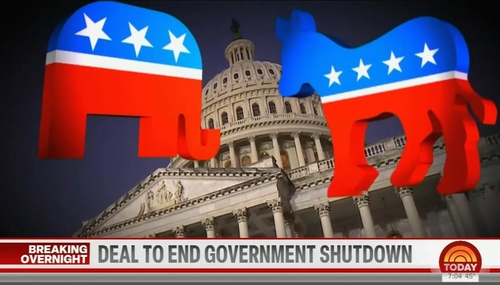In an address in Oklahoma Thursday, Al "Balance Is Bias" Gore repeated his reference made at a "media ethics" seminar in Tennessee, that "a survey of 636 articles in the 'popular press' showed that 53 percent of the stories contended that it was still unproved." But Al Gore isn't really relying on a scientific study of media coverage. This matches an article by Jules and Maxwell Boykoff titled "Journalistic Balance as Global Warming Bias. " They didn't read all national newspaper articles on global warming in a certain time frame. They picked a "random sample" instead of the full spectrum of coverage.
But wait, it gets funnier. The Boykoff brothers urge that it's unethical to allow experts skeptical of global warming into news stories. But when you turn to Jules Boykoff's college biography page, you discover that much of his writing is devoted to protesting the "suppression of dissent" in America, including by...the mass media. (His 2006 book is titled The Suppression of Dissent: How the State and Mass Media Squelch USAmerican Social Movements.) Is he against squelching dissenters -- or only in favor of it when he sees a "climate crisis" for Al Gore and other liberals to prevent?
The Boykoffs explained their methodology this way, looking at news articles with the words "global warming" in the Washington Post, New York Times, Los Angeles Times, and Wall Street Journal from 1988 to 2002:
From a total of 3,543 articles, we examined a random sample of 636 articles. Our results showed that the majority of these stories were, in fact, structured on the journalistic norm of balanced reporting, giving the impression that the scientific community was embroiled in a rip-roaring debate on whether or not humans were contributing to global warming.
More specifically, we discovered that: 53 percent of the articles gave roughly equal attention to the views that humans contribute to global warming and that climate change is exclusively the result of natural fluctuations.
Let's explain how the Boykoffs and the Bozellians differ on a media study. First, instead of studying random articles over 14 years in four newspapers, it's much more thorough to select one newspaper over 14 years, or four newspapers over three years, than it is to pull stories out of your professor's cap one by one. We call it a "Swiss cheese study" to take about 20 percent of the articles on the subject and then pretend it's all the coverage in four major newspapers.
Second, it's probably unfair to the newspapers to expect that when "global warming" first gained media traction in 1988 or 1989, that reporters would act totally convinced that the Earth was warming its way to extinction. It would be more interesting to see how these major newspapers covered it during the last five years, as arrogance about "unanimous" scientific agreement grew.
Third, when you actually read the newspaper stories the Boykoffs cite as examples of "roughly equal attention," you quickly notice that global warming skeptics are not given equal time or space in the stories cited. Even the Boykoffs complain that their example from the March 28, 1995 Washington Post is outrageous because a scientific skeptic speaks -- once, at the very end of the article.
In short, the Boykoffs aren't really complaining that the stories give skeptics of a climate crisis equal time. They're complaining that skeptics get any time or space whatsoever. They're in favor of the suppression of dissent by the mass media. And so is Al Gore.




